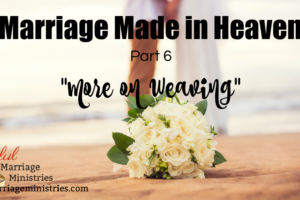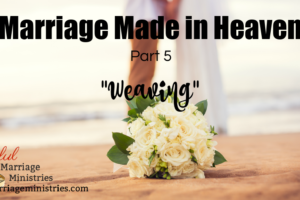We’ve all heard the phrase “a marriage made in heaven,” but it may bring to mind different thoughts and images. Perhaps, in your case, it’s of your parents’ marriage and whether it was a good one or a contentious one. Perhaps, it’s your own marriage and of the thoughts, dreams, commitments, and even preconceptions, you had when you married.
Or perhaps, it’s the thing to which you look forward or the one over which you’ve become discouraged. Wherever you are, I believe this series will have something for you. If your marriage is a good one, hopefully, you can fine-tune some things and if you’re single, I pray you’ll take away truths that will help you in any future marriage or help you minister to others who are married.
Marriage Made in Heaven? “Leaving, Cleaving & Weaving”
In the last post, I shared our testimony of marriage, divorce, remarriage, and God’s grace. If you missed it, I hope you’ll check it out.
And in the first post, I talked a little about God’s plan for marriage and how when Adam and Eve sinned and disobeyed God, it not only damaged their relationships with God but with each other.
Today we’ll zero in on, arguably, God’s clearest and most definitive statement on marriage. It’s the one statement about marriage that God makes four times (Gen. 2.24; Matt. 19.5; Mk. 10.7-8; Eph. 5.31) in the Bible.
He said it once in the Old Testament, three times in the New, once before the fall, and three times after. It was and is God’s plan and purpose for marriage in a nutshell.
Therefore a man shall leave his father and mother and be joined to his wife, and they shall become one flesh (Gen. 2.24).
As a counselor, I can tell you, more often than not, when a couple is struggling in their marriage, it can be traced back to a failure to follow this blueprint in one or more areas. So what are the components of God’s divine plan for marriage in this verse?
The keywords are “leave,” “joined,” and “one flesh.” You’ll probably remember that the word “joined” was translated “cleave” in the old King James Version. And we might call the idea of becoming one flesh, “weaving.” So we are to leave, to cleave, and to weave our lives together.

Leaving
What does it mean “to leave”?
First, what it doesn’t mean: it doesn’t mean we no longer show love and concern for our parents. It doesn’t mean we must move to a foreign country. But, it does mean our relationship with our parents needs to change if we’re to leave biblically.
The truth is, you could move hundreds of miles from home and not “leave” and you could live next door and “leave” well. Leaving has a great deal to do with your attitude toward and your dependency on your parents.
Leaving means they are no longer the ones you go to when you are faced with problems. It means you don’t depend on them emotionally, financially, or relationally. It means what they want or expect does not take priority over your spouse’s wishes.
And it means you don’t run to them when you and your spouse have a problem. In fact, that often needs to be the last place you go. Too often a young husband or wife will report every problem to one or both parents and do long-term damage to the relationship between their parents and their spouse.
Unless there is clearly some kind of abuse, wise parents will encourage their married children to communicate with and work out problems with their spouses, instead of complaining to mom and dad. If counsel is needed, it’s usually wiser to go to a pastor or counselor who is not emotionally involved. Just be sure that it is someone who will give good biblical advice.

Leaving & Family Traditions
Leaving, also, means that family traditions may change. Just because mom and dad always celebrated Christmas at midnight on Christmas Eve, doesn’t mean that’s the way it has to be or, even, should be for a new family. This is one of those issues that can cause years of tears and anger. Couples should sit down and talk about these sensitive issues. Solutions will involve compromise, unselfishness, working together as a team, and the establishment of new family traditions. It may, also, require sitting down with one or both sets of parents and lovingly explaining your decisions.
When we marry, we need to establish adult relationships with our parents. While we are always to honor our parents (care for them when they are no longer able to care for themselves, show them respect, etc.), we are no longer under the command to obey our parents. The husband and wife relationship is to become the priority relationship.

Cleaving
God intends marriage to be a permanent relationship between one man and one woman for life. Marriage is a covenant relationship. Too many today regard marriage as permanent as long as we’re happy and things work out. But when the other person is no longer meeting our perceived needs or we’re simply not happy, we believe we’re free to break that covenant.
There are biblical grounds for divorce, but especially for Christians, they are very limited.

Weaving
Weaving, what God calls a one-flesh relationship, involves much more than a physical relationship. It does include a physical/sexual relationship (1 Cor. 7.3-5), but it’s much more. It involves a weaving together of two lives relationally, financially, socially, and in many other ways.
In the next post, we’ll flesh out these three important components of a God-honoring marriage. I hope you’ll come back. You can sign up so you don’t miss them. And if you’re interested in growing your marriage and getting away for a little relaxation, check out our upcoming marriage retreat under the events tab at the top.
Blessings as you grow in Christ,
Donna ♥
* This post originally appeared on our sister site, Soul Survival.
I sometimes link up with these sites.











Recent Comments